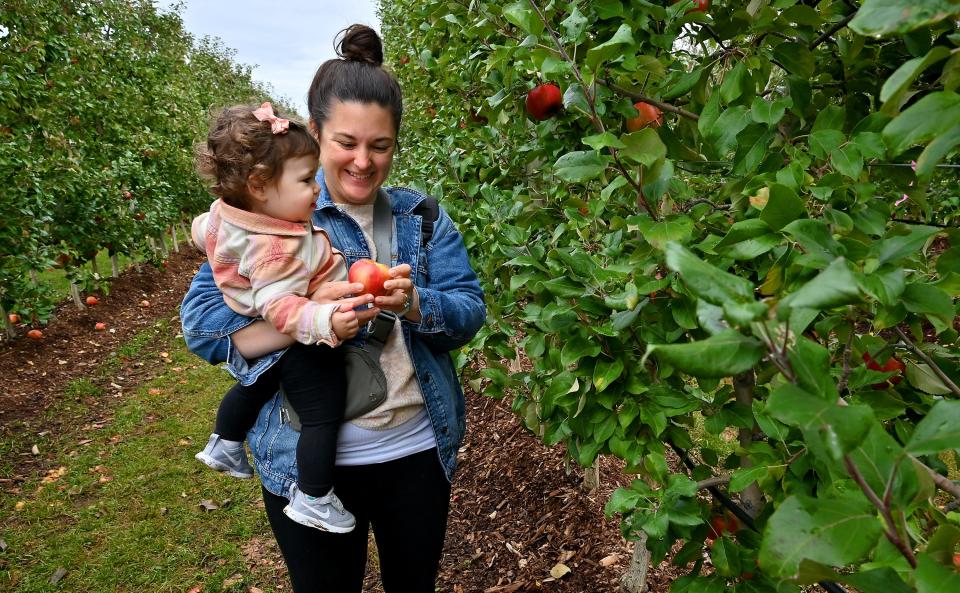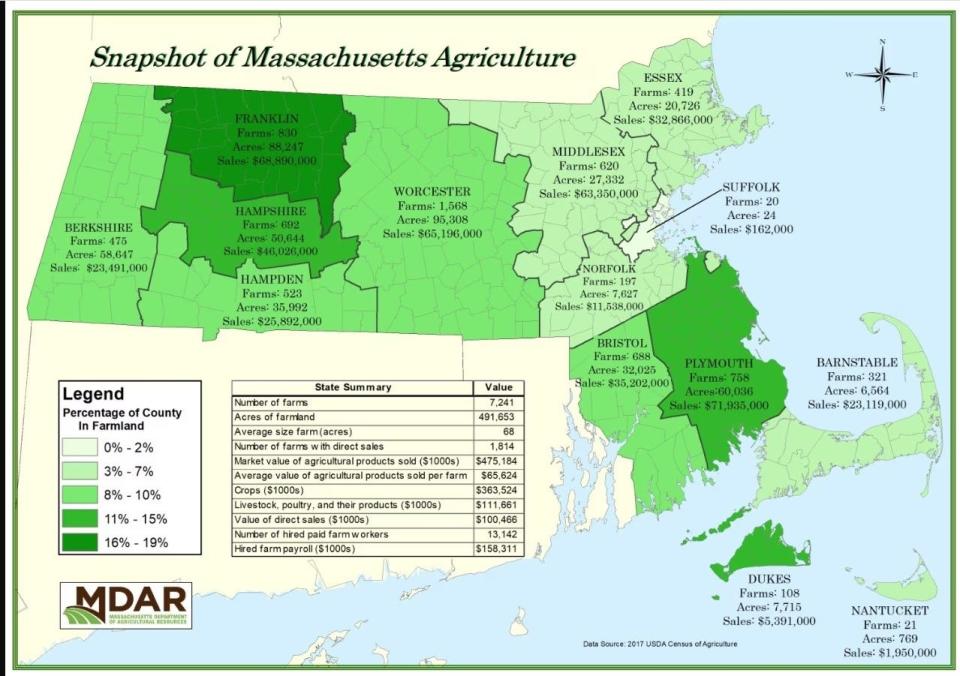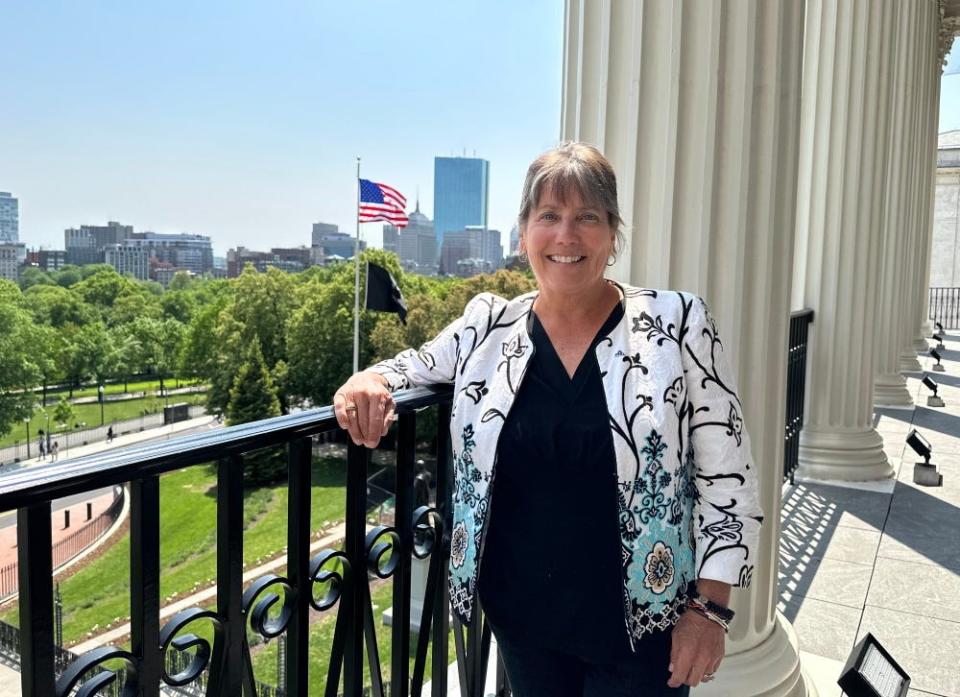Mass. legislators release bills from committee to support state's agricultural sector
- Oops!Something went wrong.Please try again later.
- Oops!Something went wrong.Please try again later.
BOSTON — A dozen bills heard by the Legislature’s Joint Committee on Agriculture throughout the course of the last year could benefit Massachusetts farms while also increasing food security, protecting farmlands and even offering financial support to the state’s lobster industry and fisheries.

With the bills voted favorably out of committee the day before the long holiday weekend, the measures just got one step closer to landing on Gov. Maura T. Healey’s desk. That final destination could take some time to reach, however. But the joint leadership has been working well together and share an urgency to getting bills moved forward.
"This is the year to help farmers. 2023 showed us the high stakes farmers face," said Sen. Jo Comerford, D-Northampton, the co-chair of the committee with Rep. Paul Schmid, D-Westport. "I'm heartened that we are working together to take care of the well-being of farms and farmers."
The committee announced Friday it had favorably advanced bills to strengthen the state's food system, fight food insecurity, protect natural and working lands, and support farmers and people working in the lobstering and fishing industries.
“This is the first session where we have had a joint committee focused specifically on agriculture, and with it comes an opportunity for the Legislature to focus on the policies needed to support commonwealth farmers and strengthen our food system,” said Comerford. “Our colleagues filed a lot of smart legislation, and I am delighted to partner with Representative Schmid to advance bills that promote food justice and security, provide disaster relief for farms and bolster sustainable agriculture practices.”
Schmid said he was proud of the work done by the committee and happy to release the dozen bills. He also discussed the different issues presented to the committee encompassing “farmers, fishermen and food justice organizations. It’s certainly exciting to be able to release these bills.”
The bills also mesh with the goals of the state’s 21st Century Agriculture Commission established to tackle hunger, food insecurity and diet-related diseases while strengthening farming and farming infrastructure in Massachusetts. The commission, chaired by Comerford, met in November to discuss specific goals including the need for the state to become more food-independent as a whole and produce at least 30% of its food requirements.

Goal to end hunger by 2030
The need to move to food independence was highlighted by the pandemic and climate change including supply chain issues, food processing issues and the toll taken by flooding rains, hurricanes, wildfires and drought. Investments in agricultural infrastructure would help the state achieve its second task: ensuring Massachusetts becomes the first state in the nation to reach the goal of ending hunger by 2030.
Companion bills filed by Sen. Patricia Jehlen, D-Somerville and Rep. Vanna Howard, D-Lowell, would direct the state Department of Agricultural Resources to establish a Food Justice Frontline Program. The agency would administer grants to nonprofit food security organizations to create jobs for people experiencing food insecurity who live in food insecure communities.
Included in the measure is a directive to Massachusetts service agencies, the Department of Transitional Assistance among others, to increase awareness about the existence of the food programs.
“We must continue supporting the nonprofits in our communities with resources to better reach and help those in need,” Jehlen said. She is confident that the bill, once it becomes law, will “greatly benefit people across the commonwealth by creating jobs and providing assistance,” especially to those residents who may not be aware that help is available.

Before vacating her senate seat, Anne Gobi, now the director of rural affairs for Massachusetts, filed legislation to establish an agricultural disaster relief fund that would offer financial support to farmers who suffer losses due to natural disasters. The measure, along with a bill that would modify restrictions on the use of farmland for nonagricultural purposes, a way to accommodate and encourage agritourism, was supported in the House by Rep. Natalie Blais, D-Deerfield. The bills “support our farmers in times of disaster and help them to diversify so that they may remain a string component of our local economy.”
The state’s aquaculture industry also received support from the committee; three proposals would benefit the state’s fishing and lobstering industry. One measure would establish a fund to support workers in the lobstering industry who suffer financial hardships that result from the closing of lobstering regions in an effort to protect endangered marine species such as right whales.
A companion measure would establish a grant program to fund research in the development of commercial fishing gear to protect undersized or juvenile fish and those that are not legal to harvest and prevent their capture by commercial fishing gear. Trawl nets, widely used in commercial fishing, can capture ancillary and juvenile fish and harm fish populations. The bill would seek to fund research, development and purchase of gear that “limits or eliminates the mortality of juvenile and other fish,” protects marine species, and maximizes “the sustainability and productivity of an affected fishery.”
Another proposal promotes the recycling of oyster shells, establishing a tax credit for people and businesses that donate empty shells to recycling organizations. The credit, $1 per 5-gallon bucket of shells, could divert oyster shells from the state’s landfills and help rebuild beaches and shoreline.
Included in the package of a dozen bills is a measure filed by Sen. Michael O. Moore, D-Millbury, that would give municipalities hoping to buy farmland, if the owner proposes to sell for development, additional time to pay for the property.
There are 7,241 farms in Massachusetts, occupying 491,653 acres of land. According to Mass.gov, the agricultural industry directly provides employment to 25,920 individuals and produces an annual market value of over $475 million in agricultural goods. The average farm produces $65,624 worth of agricultural products on 68 acres.
The year was a challenging one for state farmers, with many affected by the erratic weather. Early deep freezes affected stone fruit crops, May frosts affected apples and pears, and the unrelenting rains flooded fields, washed out crops and wrecked havoc across the state.
"We need to keep farmers farming, fishing, packaging, producing, we need to ensure food security," Comerford said. "Farming is all important to the state economy and food security in the commonwealth. The economic sector needs public investment to keep it healthy and thriving."
This article originally appeared on Telegram & Gazette: Massachusetts farmers to get boost in 2024 from agriculture bills

